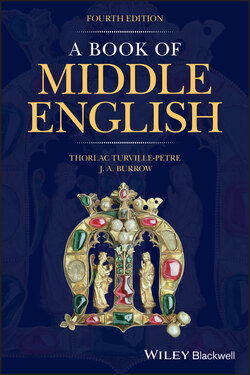Читать книгу A Book of Middle English - J. A. Burrow - Страница 98
8.4.2 ‘kind’
ОглавлениеThe noun kind (from OE) means ‘nature, species, sort’, as now, and the adjective kynde is related to the noun, originally meaning ‘natural, in accord with innate nature or kind’. It is a word rich in significance in Piers Plowman, especially in the semi‐personification Kynde Wit, ‘natural understanding’ who at one point teaches Piers how to prepare for his pilgrimage (7b/59): it is the innate understanding of right and wrong that belongs to all. Langland also uses the phrase ‘of kynde understondyng’ (7a/56), which has been variously interpreted. The basic idea is still ‘what is natural to humans’; here we take the phrase to mean ‘as is commonly agreed’: it is generally understood, says Will, that clerics should not testify in a lay court since they have their own ecclesiastical courts. In one stanza of Pearl (10/265–76) the poet plays on the noun and adjective: kynde decreed that a rose should flower and die, says the Maiden to the Dreamer, but through the kynde of the chest enclosing it now, the rose has become a pearl. The Dreamer’s refusal to accept this shows he is ‘no kynde jueler’: taking its sense from the preceding nouns, the adjective implies that the jeweller‐dreamer is acting against the natural course of things, he is not ‘right‐minded’ in that he is ungenerous, ‘not grateful’. At Arthur’s New Year celebrations in Sir Gawain and the Green Knight the court is entertained with ‘kynde caroles’ (9/473), and here the sense is ‘fitting, appropriate to the season’, what comes naturally and properly. Finally, the repentant sinner in a lyric acknowledges that Christ’s redeeming love ‘Min herte it þerlede, ʒef I wer kende’ – ‘would pierce my heart if I were kind’ (14r/19). This approaches the modern sense, ‘kind, grateful’, but still the primary meaning is ‘having natural feelings’.
